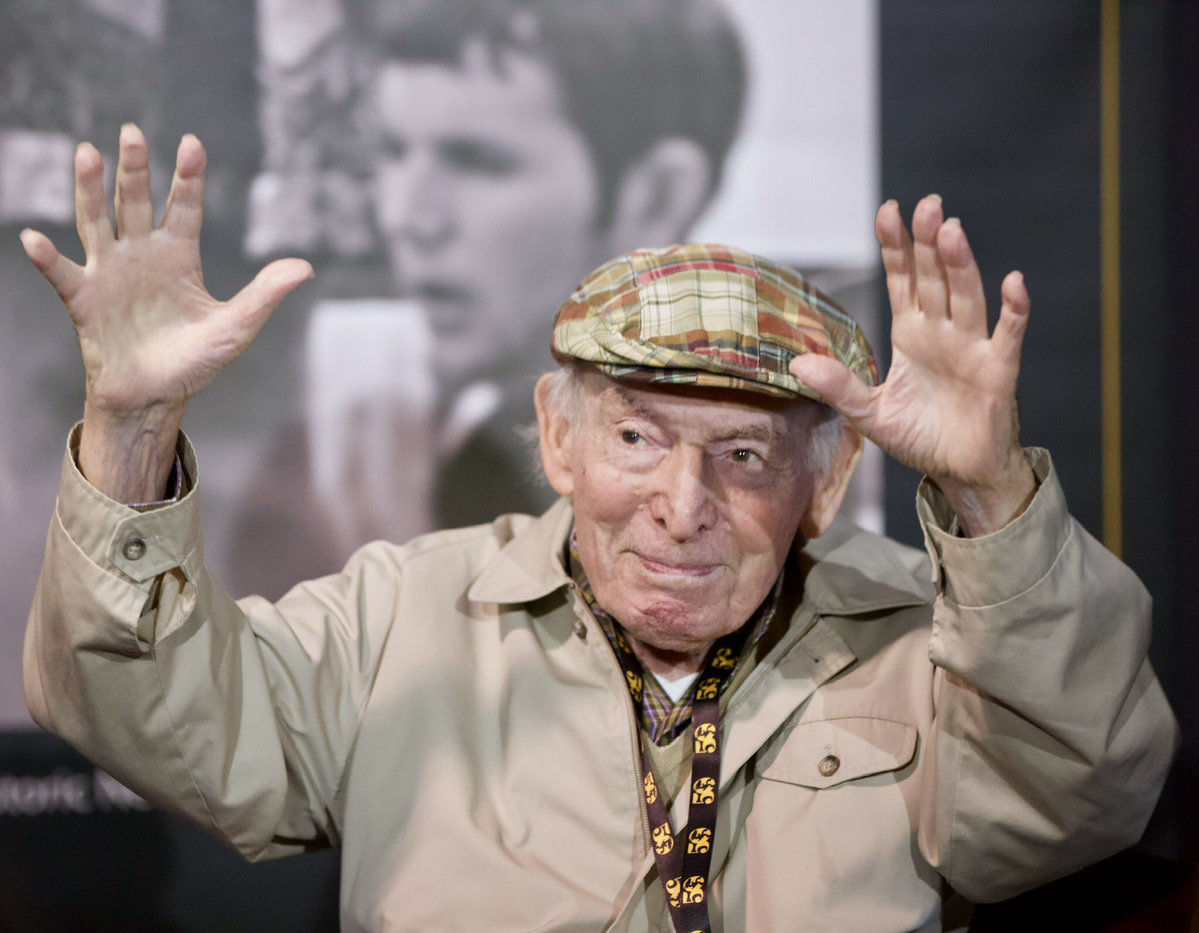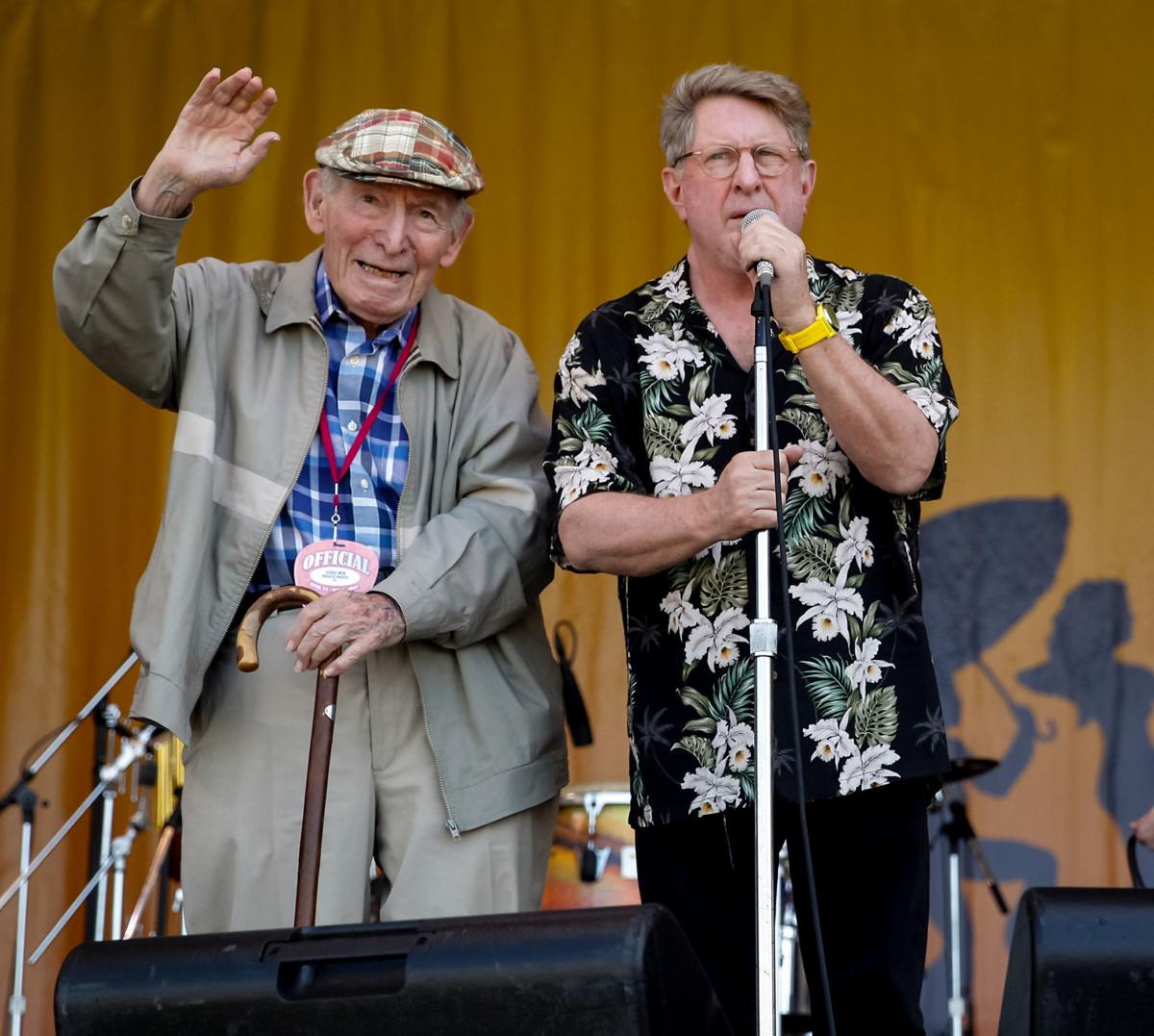George Wein, the jazz pianist and festival impresario who founded the New Orleans Jazz & Heritage Festival, died Monday in New York. He was 95.
Wein essentially pioneered the modern music festival with his work on the Newport Jazz Festival and Newport Folk Festival. His Festival Productions Inc. produced festivals and tours that brought jazz to a worldwide audience.
But he is best known in New Orleans for launching the New Orleans Jazz & Heritage Festival and Louisiana Heritage Fair in 1970. He continued to be a fixture at the festival well into his 90s, long after his protégé, Quint Davis, had assumed the day-to-day duties of producing and booking what is New Orleans' signature musical event.
A jazz pianist and promoter from Boston, Wein opened a jazz club in Boston in 1950 called Storyville, named for New Orleans’ turn-of-the-20th-century red light district.
Via Storyville, he came to the attention of socialite and jazz fan Elaine Lorillard. She hired him to create a summertime festival in the resort town of Newport, Rhode Island.
Wein produced the first Newport Jazz Festival in 1954; it became the model for the modern music festival. Five years later, he co-founded a sister festival, the Newport Folk Festival.
In 1962, Wein received a call from Olaf Lambert, manager of the Royal Orleans Hotel in the French Quarter. Would Wein be interested in producing a jazz festival in New Orleans?
As Wein recounts in his 2003 autobiography, “Myself Among Others,” he traveled to New Orleans for the first time and, over an extravagant meal at the Royal Orleans, met with New Orleans Mayor Victor H. Schiro and members of the Chamber of Commerce.
They came to an unfortunate but irrefutable conclusion: The Jim Crow South wasn’t ready for a big-time jazz festival. Many hotels would not accept Black guests. Integrated concert audiences were not permitted. And city ordinances prohibited Black and White musicians from sharing a bandstand.
Two years later, Lambert called Wein again. The Civil Rights Act had seemingly removed roadblocks to a fully integrated jazz festival. Wein returned to New Orleans and started planning a festival for the spring of 1965.
But that January, Black players from the American Football League experienced blatant discrimination while in New Orleans for the league’s all-star game. When the players threatened to boycott the game, the league orchestrated a last-minute move to Houston.
Concerned that visiting Black musicians might encounter similar problems, further tarnishing the city’s reputation, officials once again tabled plans for a festival.
The 1968 celebration of the city’s 250th anniversary offered a fresh opportunity. Durel Black, a prominent local businessman and president of the New Orleans Jazz Club, spearheaded the effort to launch a “major” jazz festival.
Once again, Wein was invited to produce it. And once again, the offer was rescinded.
The problem this time? City leaders were uncomfortable that Wein had married an African-American woman. An interracial couple’s involvement with the festival was deemed too controversial.
So the 250th anniversary celebration’s jazz committee proceeded without Wein.
“That obviously obliterated any future I might have had as a festival producer in Louisiana,” Wein wrote in “Myself Among Others."
Wein could only watch from afar as the International Jazz Festival, nicknamed "Jazzfest," proceeded without him at the Municipal Auditorium and other venues in the spring of 1968 and again in 1969.
After that second International Jazz Fest, city leaders decided a change of direction was needed.
When Wein’s jazz combo, the Newport All-Stars, traveled to New Orleans for a multi-week engagement at the Royal Sonesta Hotel, festival chairman Black approached Wein and again asked him to take charge of the city’s jazz festival. Wein’s marriage to a Black woman, the chairman assured him, was no longer an issue.
Wein signed on. And this time, it worked.
During a Feb. 20, 1970, press conference at the Royal Sonesta, Wein announced plans for the inaugural New Orleans Jazz and Heritage Festival and Louisiana Heritage Fair, scheduled for April 22–26, 1970.
He persuaded the board of the New Orleans Jazz and Heritage Foundation, the newly formed nonprofit that owned the festival, to include both indoor evening concerts and an outdoor “Louisiana Heritage Fair.” He also wanted to book more than just jazz.
In need of young, enthusiastic volunteers to round up local musicians for the Louisiana Heritage Fair, Wein called Tulane University’s Hogan Jazz Archive. That brought in Allison Miner and Quint Davis, the son of prominent architect Arthur Q. Davis. (Miner would help shape the festival’s personality, and later establish its Music Heritage Stage; she died in 1995.)
The rechristened and reborn New Orleans Jazz and Heritage Festival kicked off on Wednesday, April 22, 1970, with clarinetist Pete Fountain’s combo and trumpeter Clyde Kerr’s orchestra on the riverboat President.
The following night, Fountain headlined the Municipal Auditorium alongside the Dukes of Dixieland, Papa Albert French’s Original Tuxedo Jazz Band and pianist Sweet Emma Barrett.
New Orleans-born gospel great Mahalia Jackson topped a bill at the auditorium on Friday, April 24; the Preservation Hall Jazz Band and the New Orleans Modern Jazz Allstars featuring Ellis Marsalis also performed. The previous day, she visited the Louisiana Heritage Fair and sang a spontaneous “Just a Closer Walk with Thee” with the Eureka Brass Band.
Duke Ellington premiered his “New Orleans Suite” – which Wein had commissioned for the festival – at the auditorium on Saturday, April 25. Trumpeter Al Hirt, the Onward Brass Band, saxophonists Al Belletto and James Rivers, and vocalist Germaine Bazzle were also on the bill.
Ellington returned to the auditorium Sunday afternoon, on the festival’s final day, for a program of sacred music.
Meanwhile, various south Louisiana acts, including zydeco bandleader Clifton Chenier, the New Orleans Ragtime Orchestra and funk band the Meters, performed each afternoon inside the auditorium.
Simultaneously, the Louisiana Heritage Fair in adjacent Beauregard Square featured stages for blues, Cajun, gospel and “street bands.” Food, art and crafts were sold.
Despite the modest $3 admission, only a few hundred people paid.
That first New Orleans Jazz and Heritage Festival lost tens of thousands of dollars. A Times-Picayune account of Fountain’s April 23 auditorium concert referred to the “small but enthusiastic” crowd.
Wein would later write that Durel Black wanted to drop the outdoor Heritage Fair and focus on the evening concerts. Wein balked and threatened to walk away. The foundation board sided with Wein, ultimately determining what Jazz Fest is today – a daytime-only event.
At the press conference announcing that inaugural 1970 Jazz Fest, Wein had made a bold prediction: “New Orleans, in the long run, should become bigger than Newport in jazz festivals. Newport was manufactured, but New Orleans is the real thing.”
History proved him right.
Wein lived to see 50 editions of Jazz Fest. The 51st edition has been canceled twice because of the coronavirus pandemic.
In 2014, the New Orleans Jazz & Heritage Foundation, the non-profit that owns Jazz Fest, opened the George and Joyce Wein Jazz & Heritage Center, an education and community facility that offers free music classes in the city’s Tremé section. Wein's wife, Joyce, died in 2005.
This is a developing story.
 George Wein during “One More Once,” the Quad Stage at Fort Adams, Newport, Aug. 1, 2019 (photo: Brian Lima/ courtesy Newport Jazz Festival)
George Wein during “One More Once,” the Quad Stage at Fort Adams, Newport, Aug. 1, 2019 (photo: Brian Lima/ courtesy Newport Jazz Festival)






